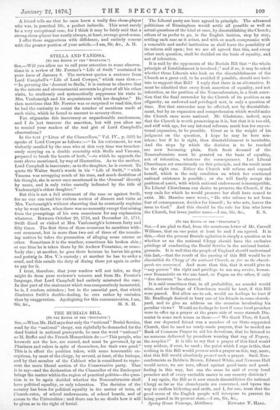[TO THE EDITOR OF THE "SPECTATOR."]
am glad to find, from the courteous letter of Mr. Carvell Williams, that on one point at least he and I am agreed. It is this,—that the present Burials agitation is simply a question as to whether or no the national Clergy should have the exclusive privilege of conducting the Burial Service in the national burial- grounds. It is well that the people of England should understand this fact,—that the result of the passing of this Bill would be to disestablish the Clergy of the national Church, as fin• as the church- yards are concerned. And more than this, that it would give to "any person" the right and privilege to use any service, howso- ever Romanistic on the one hand, or Pagan on the other, if only " due decorum " be observed.
It is said sometimes that, in all probability, no scandal would arise, and no feelings of Churchmen would be hurt, if this Bill were passed. But allow me to ask, would no feelings be hurt if Mr. Bradlaugh desired to bury one of his friends in some church- yard, and to give an address on the occasion inculcating his peculiar views ? Would no feelings be hurt if some local preacher were to offer up a prayer at the grave-side of some staunch Dis- senter in some such terms as these :—" We thank Thee, 0 Lord, that our departed friend was a member of no State-supported Church, that he used no ready-made prayers, that he needed no Book of Common Prayer to aid his devotions, that he listened to no sermons delivered by preachers wearing that rag of Popery, the surplice ?" It is idle to say that a prayer of this kind would very seldom, if ever, be used ; the point which I urge is this, that nothing in this Bill would prevent such a prayer as this, nay, more, that this Bill would absolutely protect such a prayer. Sueli Non- conformists as Baldwin Brown, Edward W hite, and Newman Hall would never, we are sure, offend against good-taste and good- feeling in this way, but can the same be said of every local preacher and of every excitable ranter in our country districts ?
I say again, the Bill as it now stands disestablishes the national Clergy as far as the churchyards are concerned, and 'opens the way to endless bickering and strife, and I, for one, trust that the good-sense of the English people will interpose to prevent its being passed in its present state.—I am, Sir, &c., Spring Grove Vicarage, Middlesex. EDWARD V. HMI.


































 Previous page
Previous page